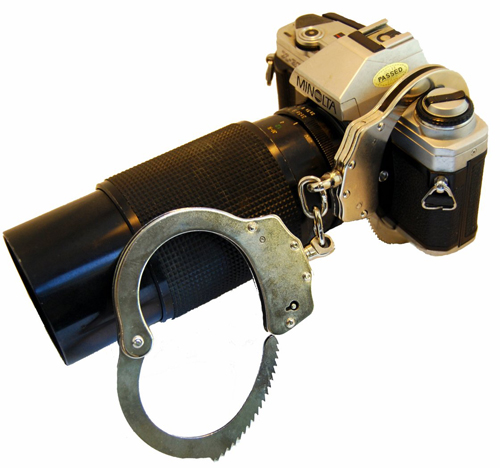
Photo by Boris Kafka, all rights reserved
As photographers it’s imperative that we understand and exercise our rights appropriately. In the age of terror, which the US government persistently tells us we live in, it is becoming more and more common for photographers to be met with hostility, harassment, and sometimes physical intervention while photographing in public. Photographers are being told to hand over their equipment; memory cards, film, camera, etc. by overzealous security officials or law enforcement officers stepping beyond their accepted bounds of authority. While our nation is gripped with fear of attack, we need to know our rights.
As a disclaimer I would like to state that if you find yourself in a situation where your physical well-being is in jeopardy please be smart and courteous. Do not risk personal harm if a situation arises, there are legal avenues that can be pursued if an individual of authority over steps their bounds.
Most of this information was pulled from this pdf document, written by Bert P. Krages II, attorney at law.
The Law
I. While photographing in public, you may take pictures of anyone or anything. Public places include streets, sidewalks, shopping malls, parks, etc. You are also permitted to take pictures of private property so long as you are taking the picture from public property.
II. People in public places can be photographed without their consent unless they have made a reasonable effort to maintain their personal privacy. This means that it’s not OK to take pictures of people at the ATM.
III. Trespass is generally illegal and the land owner has the right to forbid you from shooting on their property. Taking pictures on government installations is very similar and is usually restricted.
IV. Contrary to what many believe, it is legal to photograph crime scenes, accidents, bridges, airports, industrial facilities, residential and commercial buildings, children, and police. Security concerns are often cited as reason why you cannot photograph these subjects, but that argument is not valid because you are taking those pictures from a public vantage point.
V. If pressed, you do not have to disclose your reason(s) for taking pictures or your identity (unless asked by the police). You cannot be detained by private parties and you do not have to consent to confiscation of your equipment. The police need a court order to confiscate anything; without a court order they can be held liable for theft or coercion.
Additional Considerations
- Try not to make the situation worse. Be calm and courteous.
- If a physical altercation seems imminent be prepared to call the police.
- Threats, detention and confiscation are all grounds for legal action. Get the person’s name, employer, and reasons for their actions.
Remember I am not a lawyer and this post may not be entirely accurate. This was sourced from a reliable attorneys website, but the pamphlet has not been updated since 2006, so it may be outdated. As of writing this the Patriot Act contains no limitations or regulations that deal specifically with photography.
![[del.icio.us]](http://thephotoplayground.com/wp-content/plugins/bookmarkify/delicious.png)
![[Digg]](http://thephotoplayground.com/wp-content/plugins/bookmarkify/digg.png)
![[Facebook]](http://thephotoplayground.com/wp-content/plugins/bookmarkify/facebook.png)
![[Furl]](http://thephotoplayground.com/wp-content/plugins/bookmarkify/furl.png)
![[Google]](http://thephotoplayground.com/wp-content/plugins/bookmarkify/google.png)
![[LinkedIn]](http://thephotoplayground.com/wp-content/plugins/bookmarkify/linkedin.png)
![[Reddit]](http://thephotoplayground.com/wp-content/plugins/bookmarkify/reddit.png)
![[StumbleUpon]](http://thephotoplayground.com/wp-content/plugins/bookmarkify/stumbleupon.png)
![[Technorati]](http://thephotoplayground.com/wp-content/plugins/bookmarkify/technorati.png)
![[Twitter]](http://thephotoplayground.com/wp-content/plugins/bookmarkify/twitter.png)
![[Email]](http://thephotoplayground.com/wp-content/plugins/bookmarkify/email.png)




















